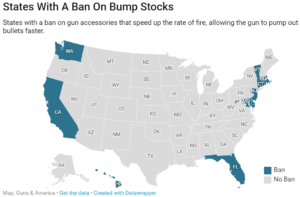|
|
Staff Writer
In a 6-3 decision on June 14, the U.S. Supreme Court overturned the Bureau of Alcohol, Tobacco, Firearms and Explosives’ ban on bump stocks, a firearm accessory that enables semi-automatic weapons to fire at rates similar to automatic weapons. The ruling, Garland v. Cargill, marks a significant shift in gun regulation, overturning a policy enacted during the Trump administration.

The ATF ban on bump stocks was a direct response to the October 1, 2017, mass shooting in Las Vegas, the deadliest in U.S. history. The shooter used bump stocks to modify his weapons, enabling them to fire like machine guns, resulting in the deaths of 60 people and injuries to hundreds more.

In response to the Supreme Court ruling, Ohio Sen. Kent Smith has championed Senate Bill 307, which seeks to ban bump stocks in the state. The bill has garnered bipartisan support, with legislators from both parties introducing similar measures in Congress. Currently, bump stocks are illegal in more than a dozen states, including those led by Republican governors.
Justice Sonia Sotomayor, in her dissent, sharply criticized the decision, stating, “When I see a bird that walks like a duck, swims like a duck, and quacks like a duck, I call that a duck. A bump stock-equipped semi-automatic rifle fires automatically more than one shot without manual reloading by a single function of the trigger. Like Congress, I call that a machine gun.”

While opponents view the ruling as a setback for public safety, supporters of SB 307 hope the legislation will address the issue at the state level. The coming months will reveal how Ohio representatives and the broader legislative community respond to this contentious issue.







